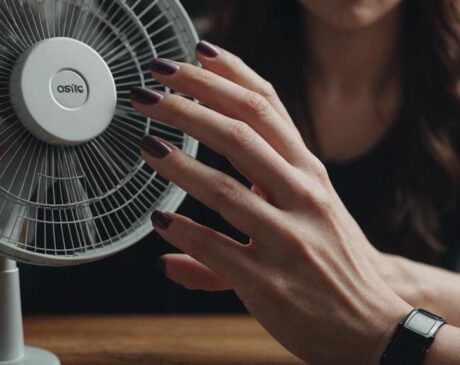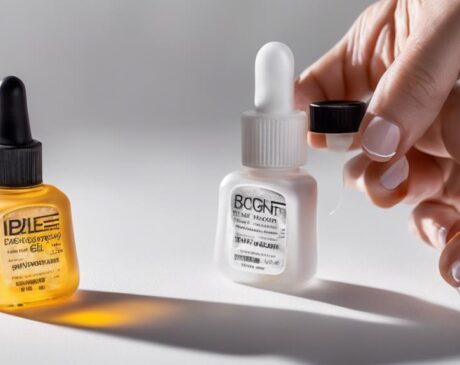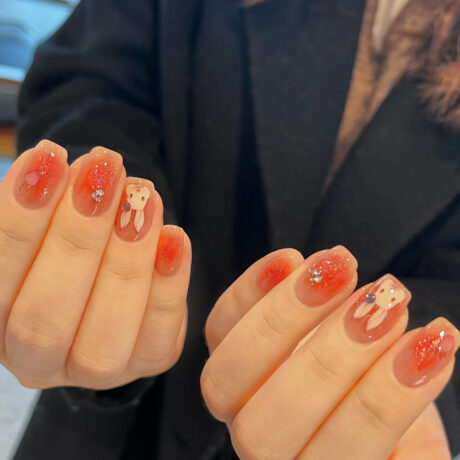What Nail Glue Is Best for Nails?
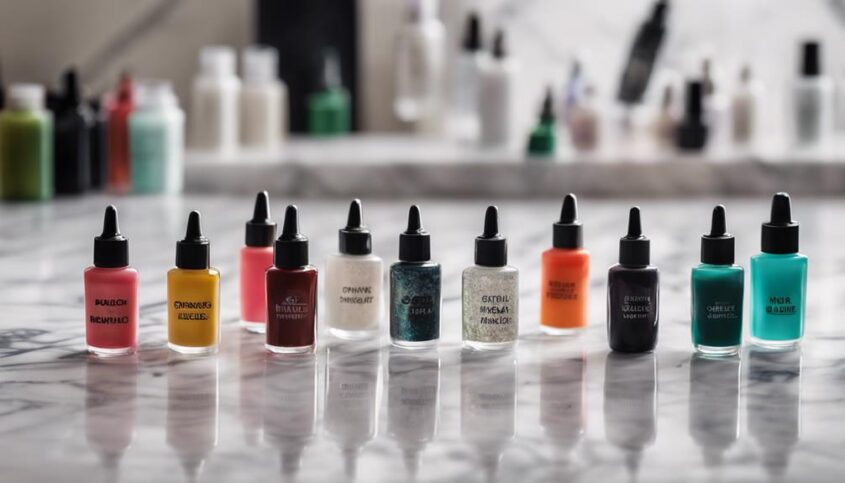
Selecting the ideal nail glue involves considering factors like bonding power, drying time, and ease of use. Brands like Kiss, IBD, and Tomicca offer strong options. Cyanoacrylate glues bond quickly while Methacrylate provides durability. Ethyl cyanoacrylate suits sensitive skin. Gel and brush-on glues cater to different preferences. Following removal tips and safety precautions is key for nail health. Achieving long-lasting and attractive nails requires choosing a glue that fits your needs.
Key Takeaways
- Consider Cyanoacrylate-based glue for quick bonding.
- Choose Methacrylate-based glue for flexibility and durability.
- Opt for Ethyl cyanoacrylate for sensitive skin and nails.
- Try Gel nail glue for precision and control.
- Use Brush-on nail glue for easy and mess-free application.
Types of Nail Glue
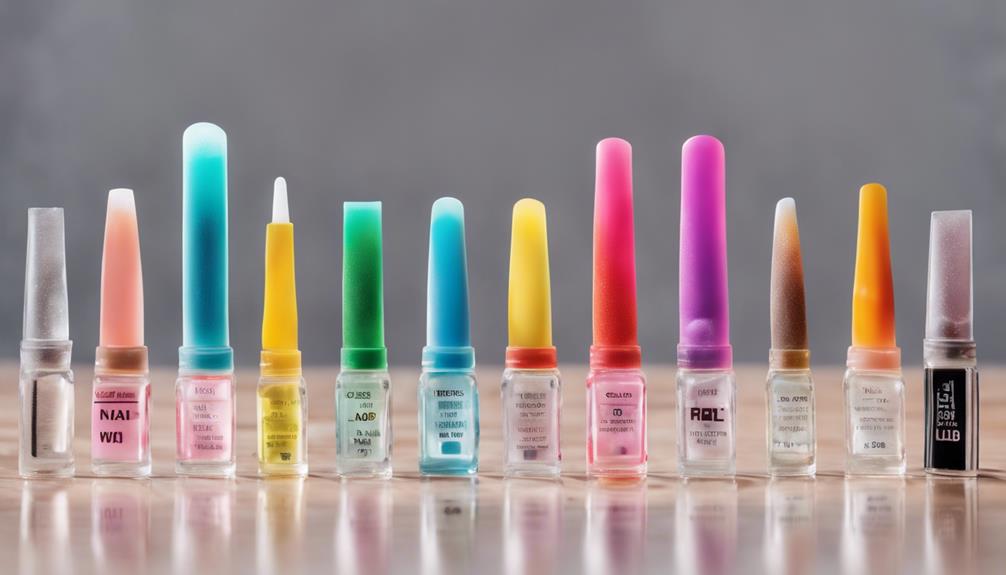
When considering the various types of nail glue available, it is essential to understand their distinct formulations and intended applications. Nail glues can vary significantly in terms of drying time variations and longevity differences. Some formulas dry in seconds, ideal for quick touch-ups, while others offer a more extended drying time for precise application. Moreover, longevity differences among nail glues can impact how long the manicure stays intact. Understanding these factors is crucial in selecting the most suitable nail glue for your needs.
In addition to performance factors, price range and shelf life are essential considerations when choosing nail glue. Prices can vary depending on the brand, quality, and quantity of the product. It's important to strike a balance between cost and quality to ensure you get a product that meets your expectations. Furthermore, shelf life indicates how long the nail glue remains usable before it starts to degrade. Opting for a nail glue with a longer shelf life can help prevent wastage and ensure you get the most out of your purchase.
Strengths of Each Type
When evaluating nail glue options, it's crucial to consider factors like bonding power differences and application ease. These aspects play a significant role in determining the overall quality and effectiveness of the nail glue chosen.
Bonding Power Differences
The varying bonding powers of different types of nail glue significantly influence their effectiveness in adhering artificial nails to natural nails. When comparing drying times, quick-dry nail glues offer the advantage of setting rapidly, reducing the risk of smudging or displacement during application.
Conversely, some formulas may require longer drying periods to achieve a secure bond. In terms of longevity of hold, certain nail glues boast extended durability, keeping artificial nails securely attached for weeks without needing frequent touch-ups.
On the other hand, some options may provide a shorter hold duration, necessitating more frequent reapplications. Understanding these differences in bonding power can help individuals select the nail glue that best aligns with their preferences and needs for long-lasting and reliable nail enhancements.
Application Ease Comparison
Understanding the varying bonding powers of different types of nail glue sheds light on the strengths of each type concerning application ease.
When comparing nail glues for application ease, drying time plays a crucial role. Brush-on nail glues tend to have quicker drying times than tube glues, making them ideal for those seeking efficiency in their nail application process.
Additionally, considering odor levels is essential for a pleasant user experience. Some nail glues are formulated to have lower odor levels, catering to individuals sensitive to strong smells.
Weaknesses of Each Type
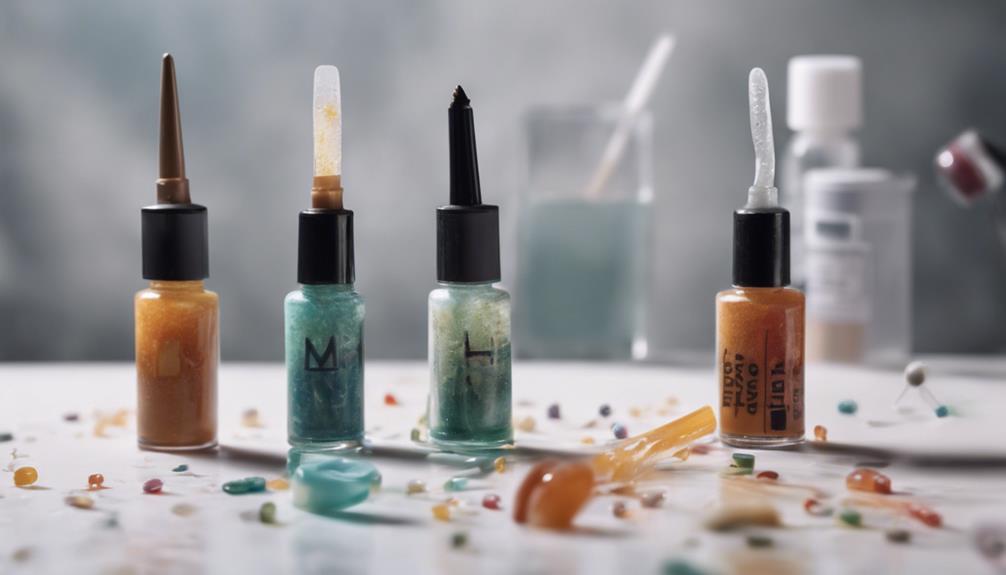
Several common weaknesses can be identified when evaluating different types of nail glue for their effectiveness and durability. One key weakness that varies among nail glues is the drying time. Some nail glues may dry too quickly, making it challenging to adjust the nail placement, while others may dry too slowly, leading to a longer application process. Finding a balance between quick drying for efficiency and sufficient working time for precise application is essential for a satisfactory outcome.
Another crucial aspect to consider is the trade-off between durability and flexibility. Some nail glues may provide exceptional durability, ensuring long-lasting adhesion but lacking flexibility, which can result in nails that are more prone to breakage. On the other hand, more flexible nail glues may not last as long, especially for individuals with active lifestyles or jobs that require frequent hand use. Striking the right balance between durability and flexibility is crucial for achieving strong and long-lasting nail enhancements.
Factors to Consider
Factors influencing the selection of the most suitable nail glue include drying time, durability, flexibility, and ease of application. Drying time is a crucial factor for those seeking quick nail fixes or professional nail technicians working efficiently.
Longevity is another key consideration as individuals desire nail glue that can withstand daily activities without frequent touch-ups. Durability is essential for maintaining nail enhancements for an extended period.
Flexibility in nail glue allows for natural movement without easily breaking or chipping. Ease of application is vital for both professionals and at-home users to achieve desired results effortlessly.
When deciding on a nail glue, price and availability also play significant roles. While some may opt for high-end nail glues for superior quality, others may prioritize budget-friendly options that offer satisfactory results.
Additionally, the accessibility of the chosen nail glue brand is crucial to ensure convenience in restocking or purchasing replacements.
Application Techniques

To achieve optimal results with nail glue, mastering proper application techniques is essential. When applying nail glue, consider the following:
- Drying Time: Allow the glue to dry fully before exposing your nails to water or other elements. This ensures a strong bond and prevents premature lifting of the nails. Additionally, understanding the removal process is crucial to prevent damage to your natural nails when it's time to remove the artificial ones.
- Longevity: Proper application techniques not only ensure a secure bond but also contribute to the longevity of your manicure. By applying the right amount of glue and evenly distributing it, you can enjoy your nail enhancements for an extended period, maximizing their longevity and cost efficiency.
- Cost Efficiency: Mastering application techniques can also lead to cost efficiency. When the glue is applied correctly, you can reduce the frequency of reapplications, saving both time and money in the long run. By investing time in mastering these techniques, you can enjoy beautiful nails that last.
Removal Methods
When it comes to removing nail glue, there are a few effective methods to consider.
Soaking nails in acetone is a common technique that helps dissolve the glue for easier removal.
Alternatively, gently peeling off the glue can also work, but it requires patience and care to avoid damaging the nails.
Soaking in Acetone
For effective removal of nail glue, soaking in acetone is a common method utilized by nail technicians and individuals at home. Acetone, a solvent, effectively breaks down the adhesive properties of the glue, allowing for easier removal.
However, it is essential to consider acetone's potential drawbacks, such as its drying effect on nails and cuticles. To mitigate these concerns, individuals can explore acetone alternatives or opt for DIY removal methods that are gentler on nail health.
When using acetone, it's crucial to take precautions to maintain nail health, such as moisturizing the nails and cuticles after the removal process.
Here are some key points to consider when soaking nails in acetone:
- Use acetone alternatives for a gentler removal process.
- Take precautions to protect nail health and avoid excessive drying.
- Consider DIY removal methods to maintain nail strength and integrity.
Peeling off Gently
Gentle removal methods are essential for preserving the health and integrity of nails when peeling off nail glue. To maintain nail health, consider DIY solutions that prioritize gentle techniques.
One innovative method involves soaking a cotton ball in acetone, placing it on the nail, and wrapping it with aluminum foil to enhance the removal process without excessive force. Alternatively, using a wooden cuticle stick to gently lift the edges of the glue can help loosen its grip on the nail, facilitating easier removal.
Top Recommended Brands
Renowned for their quality and longevity, the top recommended brands of nail glue have garnered praise from beauty enthusiasts worldwide. When choosing the best nail glue, considering the brand reputation is crucial. Here are some top recommended brands known for their exceptional nail adhesives:
- Kiss: Kiss nail glue is a favorite among nail technicians and DIY nail enthusiasts for its strong bonding power and quick drying formula. This brand offers a range of nail glues suitable for various nail art applications.
- IBD: IBD is recognized for its professional-grade nail products, including top-quality nail glues that ensure long-lasting adhesion. Despite being slightly pricier, the quality and durability justify the cost.
- Tomicca: Tomicca nail glue is a budget-friendly option without compromising on performance. It provides a reliable bond for artificial nails and repairs at an affordable price point.
When comparing these brands, it's essential to consider not only the price range but also factors like drying time, strength, and ease of use to select the nail glue that best suits your needs.
Frequently Asked Questions
Can Nail Glue Be Used on Natural Nails or Is It Only for Artificial Nails?
Nail glue can be used on natural nails for various applications like mending splits or attaching nail art. However, caution must be exercised when using it on natural nails to avoid damage. It's predominantly employed for attaching artificial nails, facilitating easy removal.
How Long Does Nail Glue Typically Last Before Needing to Be Reapplied?
In the realm of nail care, the longevity of nail glue varies depending on factors like application technique and daily activities. Typically, nail glue lasts 1-2 weeks before reapplication is needed. For prolonged wear, apply sparingly and follow proper removal processes.
Are There Any Potential Side Effects or Risks Associated With Using Nail Glue?
Potential allergies and risks associated with nail glue can arise due to improper application, leading to skin irritation or contact dermatitis. To mitigate these risks, always follow proper application techniques and perform a patch test before use.
Can Nail Glue Be Easily Removed Without Damaging the Nails?
When considering nail glue removal, precautions must be taken to avoid damaging nails. Alternative methods like soaking in acetone or using a nail polish remover with acetone can help safely dissolve the glue without harming your nails.
Is There a Specific Way to Store Nail Glue to Prolong Its Shelf Life?
Proper storage of nail glue is essential for extending its shelf life. To maintain longevity, store in a cool, dry place away from sunlight. Follow recommended application techniques, adhere to safety precautions, and use a gentle removal process to safeguard nail health.
Conclusion
In conclusion, choosing the best nail glue depends on factors such as desired strength, ease of application, and removal method.
Like a well-crafted puzzle piece, finding the perfect nail glue that fits your needs and preferences will ensure long-lasting and beautiful nails.
Consider the different types available, their strengths and weaknesses, and top recommended brands to make an informed decision for your nail care routine.


